biotechrabbit™ AllScript Reverse Transcriptase is a proprietary RT designed for highly specific and sensitive reverse transcription. It guarantees top performance in standard reverse transcription, synthesis of ds cDNA for cloning, RT-PCR and qRT-PCR, rapid amplification of cDNA ends (RACE) or RNA analysis by primer extension. It’s high affinity to RNA allows transcription of complex RNA secondary structures and targets in low copy number, leading to high yields of cDNA.
AllScript Reverse Transcriptase is a multifunctional enzyme including RNA-dependent and ssDNA-dependent DNA polymerase, as well as RNase H activity. The RNase H activity is specific to RNA hybridized to cDNA, with no effect on pure RNA template, resulting in improved performance of subsequent PCR.
Component | Composition |
AllScript Reverse Transcriptase | AllScript Reverse Transcriptase, 4 U/µl, in storage buffer containing 50% (v/v) glycerol. |
5× Reverse Transcriptase Buffer | Optimized 5× Reaction Buffer for AllScript Reverse Transcriptase. |
STORAGE | -20°C (until expiry date – see product label) |
Unit Definition
One unit is the amount of enzyme activity that incorporates 1 nmole of dTTP into acid insoluble fraction in 10 minutes at 42°C when poly(A)+ RNA and oligo(dT)20 are used as template–primer.
Quality Control
Exonuclease assay
Linearized lambda/HindIII fragments are incubated with the Reverse Transcriptase in a 50 µl reaction mixture for 16 h at 37°C. No degradation of DNA was observed.
Endonuclease/Nick Activity
Supercoiled plasmid DNA is incubated with the enzyme in a 50 µl reaction mixture for 4 h at 37°C. No conversion of covalently closed circular DNA to nicked DNA detected.
Contamination with E. coli DNA
Absence of E. coli genomic DNA is confirmed by qPCR using a sample of the enzyme and specific primers targeting the E. coli 16S rRNA gene. No contamination detected.
RNase Assay
An RNA template is incubated with the enzyme in a 20 µl reaction mixture for 1 h at 42°C. No RNA degradation observed.
Functional Assay
cDNA synthesis with Oligo (dT) and/or Hexamer primers, followed by PCR.
Prevention of cDNA synthesis reaction contamination
RNase contamination is an exceptional concern when working with RNA. RNase A, providing most threat to RNA integrity, is a highly stable contaminant of any laboratory. To prevent RNA from degradation and to minimize possibility of contamination during cDNA synthesis; follow the guidelines below:
- Use separate clean areas for preparation of the samples and the reaction mixture.
- DEPC-treat all tubes and pipette tips or use certified nuclease-free labware with aerosol filters.
- Wear fresh gloves when handling RNA and all reagents.
- Always assess the integrity of RNA prior to cDNA synthesis in denaturing agarose gel electrophoresis.
- Use RNase free water and other reagents.
- To prevent RNA from degradation, add Ribonuclease inhibitor (optional) in to the cDNA synthesis reaction (20 units for 20 µl reaction).
Typical cDNA synthesis reaction set up
- Thaw on ice and mix very well all reagents.
- Assemble and keep all reactions on ice.
- To use time and reagents effectively, always prepare master mix for multiple reactions. For a master mix volume, always calculate the number reactions that you need plus one additional.
- Combine the following in an RNase-free reaction tube:
Component | Volume | Final concentration |
dNTP Mix (10 mM each dNTP) | 1 µl | 0.5 mM (each dNTP) |
RNase Inhibitor, 40 U/µl (optional) | 0.5 µl | 1 U/µl |
Oligo (dT)12–18 (10 µM) – or Hexamer Primer (100 µM) – or Gene Specific Primer (10 µM) | 2 µl 2 µl 0.2 - 2 µl | 1 µM 10 µM 0.1 - 1 µM |
5× Reverse Transcriptase Buffer | 4 µl | 1× |
RNA Template | 50 ng – 2 µg total RNA or 50–500 ng mRNA (polyA) |
|
AllScript Reverse Transcriptase | 0.5 - 1 µl | 0.125 - 0.25 U/µl |
RNase-free water | Variable |
|
Total volume | 20 µl |
|
- Mix and collect the drops by centrifuging briefly
- When using
- Hexamer Primer, incubate 10 minutes at 30°C followed by 37–50°C for 30 minutes (increase up to 60 min, if needed)
- Oligo (dT) or gene-specific Primer incubate at 37–50°C for 30 minutes (increase up to 60 min, if needed)
- Reaction temperature can be raised to 55°C (small activity reduction may occur)
- In case of higher secondary structures, perform a pre-incubation of the RNA template for 5 min at 65°C (place on ice immediately after) and/or increase the incubation time for the subsequent RT reaction (at 37-50°C)
- Inactivate the enzyme at 95°C for 5 min
- Collect the drops by spinning briefly
- Store products at –20°C or proceed to next step, like PCR or qPCR.
- Use maximum 10 µl of the cDNA synthesis reaction mix for PCR in 50 µl volume.
You may also be interested in the following product(s)
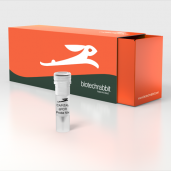
4X CAPITAL™ qPCR Probe Master Mix
Package Sizes |
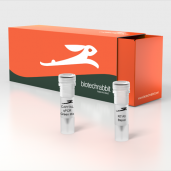
4X CAPITAL™ 1-Step qRT-PCR Green Master Mix
Package Sizes |
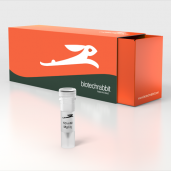
50 mM MgCl2
Package Sizes |
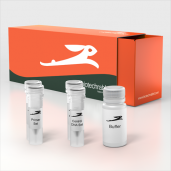
RTS Linear Template Kit Plus
Package Sizes |
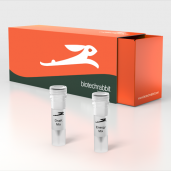
RTS DnaK Supplement
Package Sizes |
